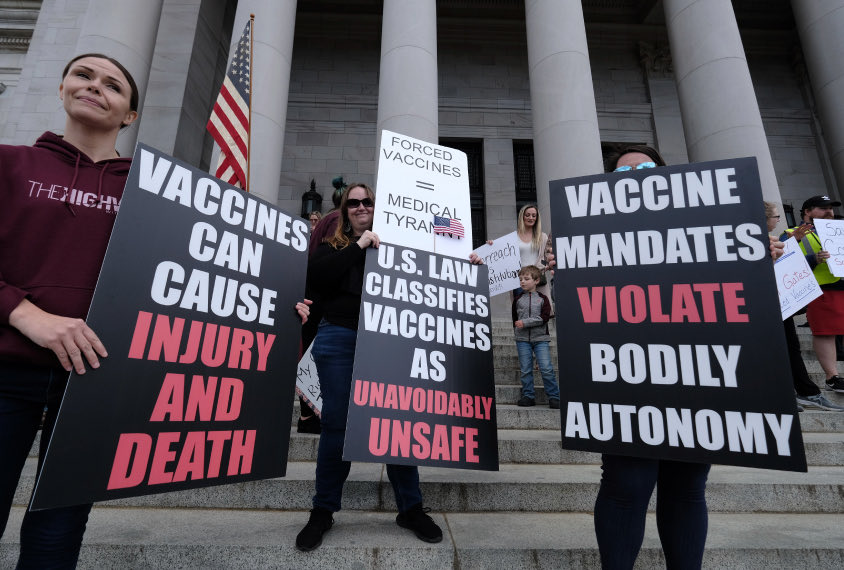Once covid vaccines launch, we might trick ourselves into believing they cause everything from colorectal cancer to diabetes to heart disease & lupus. Well-meaning data miners could do real harm. We need to vaccinate ourselves against that. Here’s how. 1/
Consider that many people have avoided going to the doctor for regular checkups during covid. They haven’t gotten preventative care. They haven’t been diagnosed with emergent conditions. They might now have heart disease or cancer and not yet know it. 2/
Here’s a paper showing that cancer diagnoses have gone down during covid. They say “The delay in diagnosis will likely lead to presentation at more advanced stages and poorer clinical outcomes.“ https://jamanetwork.com/journals/jamanetworkopen/fullarticle/2768946">https://jamanetwork.com/journals/... 3/
Consider that COVID vaccines will first go to vulnerable people, older people (& healthcare/front-line workers). They will go in for those long-delayed checkups in the month or two after they are vaccinated & get diagnosed w/ many conditions. Better late than never... but... 4/
...b/c FDA will approve vaccines based on a few months of follow-up data, many will debate their “long-term safety” over months/years. I think it’s highly unlikely current front-runner vaccines will have long-term safety issues, but people understandably will want data. 5/
Researchers will mine healthcare data for correlation of covid vaccination w/ emergence of all kinds of medical problems in the months after. They’ll compare rate of cancer, heart disease, lupus, etc in vaccinated people vs historical records & see an increase in everything. 6/
They will compared to current unvaccinated people and see that the vaccinated people have more of everything (except covid)... because they are actually going in to see their doctors for checkups and those diseases are being diagnosed. 7/
There MAY BE a somewhat fairer comparison... wait until after the pandemic when everyone is going back in for checkups and then compare the rate of diseases among the vaccinated and unvaccinated, but be careful to match on age, weight, prior health status. 8/
Even then it’s likely that less healthy people will be more likely to be vaccinated, so it might be hard (though given how politicized vaccines are, not impossible in America) to find similarly vulnerable people who have elected to go unvaccinated. 9/
There is arguably a better way to really establish long-term safety of vaccines but it may not be entirely satisfying. Compare people vaccinated with different vaccines but at same time to one another, not to past or to unvaccinated. 10/
We are likely to see the launch in a tight period of time (within a few months of one another) of several vaccines. Potentially 2 adenoviral vaccines (AZ, JNJ). Potentially 2 mRNA (Moderna, Pfizer), & one adjuvanted-protein (Novavax). 11/
These are very different types of drugs. It’s extremely unlikely they would cause same long-term adverse effects if they had any. Even the two mRNAs could plausibly be different enough that we shouldn’t assume that a long-term safety problem of one would apply to other. 12/
Therefore, if we somehow functionally randomize who gets the various vaccines & compare diagnosis rates for all diseases, we will hopefully see same patterns of diseases associated w/ all vaccines; even if higher than in past b/c of covid neglect, means they are all safe... 13/
...except in the eyes of the hardened anti-vaxxers who will say that they all are dangerous. But doing this kind of real-world experiment won’t be easy. The vaccines won’t come out exactly at the same time. If we get 50M vaccine courses of Pfizer’s mRNA first... 14/
...it might disproportionately go to most vulnerable people. Then next vaccines might go to less vulnerable (healthier) people. And so on. Also, vaccines might not be similarly effective. We already know that neutralizing antibody titers are lowest for adenoviral vaccines... 15/
...and highest for adjuvanted-protein vaccines, which looks to emerge just after adenoviral & mRNA vaccines. & also they aren’t similarly tolerated. mRNA vaccines are especially painful... that might cause people to have a stronger negative association & that might... 16/
...cause some patients to worry about long-term consequences & over-report symptoms that result in over-diagnosis of conditions that, while absolutely real for many patients, involve subjectivity on part of physician (eg fibromyalgia, migraine, chronic fatigue). 17/
Ultimately, best way to deal w/ worry that such analyses might kick up is to consider in advance how flawed they would be & not fall for them. Hopefully researchers won’t write up papers w/ such flawed conclusions. Certainly they should fail peer-review (remember that?). 18/
Remember the flawed analysis of infection rates back when researchers didn’t consider the false positive rate of covid tests? I do. Here’s one of my tweet threads about it. Consequences are going to be greater when it comes to analyzing vaccine safety data. 19/ https://twitter.com/peterkolchinsky/status/1251585935994740736">https://twitter.com/peterkolc...
I’m sure we’ll see advanced guidance on proper real-world analysis in credible journals. & when vaccine safety news comes out, we all (especially media) should first look to data-driven people w/ integrity: @DrWoodcockFDA, Moncef Slaoui, @EricTopol, Dr Fauci @NIAIDNews et al. /20

 Read on Twitter
Read on Twitter





